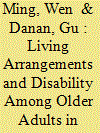| Srl | Item |
| 1 |
ID:
182756


|
|
|
|
|
| Summary/Abstract |
Infectious diseases put health of millions at risk and induce large socioeconomic costs each year. However, the long-term effects of exposure to infectious diseases on the elderly have received minimal attention. Using data from the Chinese Longitudinal Healthy Longevity Survey, this study adopts a differences-in-differences strategy to evaluate the long-term effects of epidemic exposure on old-age mortality. We find that intense exposure to the severe acute respiratory syndrome (SARS) epidemic led to an increase in old-age mortality after the SARS outbreak. We provide some suggestive evidence that exposure to SARS increased psychological stress and limitations in physical activities among old people.
|
|
|
|
|
|
|
|
|
|
|
|
|
|
|
|
| 2 |
ID:
183205


|
|
|
|
|
| Summary/Abstract |
Using data from a large representative longitudinal sample of older adults in China, the current study examines the associations between living arrangements and disability measured by activities of daily living (ADL) and instrumental activities of daily living (IADL). The cross-sectional models showed that living alone was associated with the lowest odds of disability among all the seven types of living arrangements. Living with others who are not spouses or offspring and living in an institution were linked to the highest odds of disability, particularly in more recent waves. Other forms of living arrangements such as living with spouse only, living with adult children and living in skipped-generation households lay somewhere in the middle in the correlation to disability. Findings from the transitional models revealed that moving from independent living towards co-residence with family corresponded to higher risks of disability. Overall, the associations were stronger for ADL disability than for IADL disability. The authors observed temporal fluctuations rather than linear trends in these patterns across the 16 years of the study from 2002 to 2018. Study implications are discussed.
|
|
|
|
|
|
|
|
|
|
|
|
|
|
|
|
| 3 |
ID:
168301


|
|
|
|
|
| Summary/Abstract |
By 2020, every UK household has the option to have a Smart Energy Monitor (SEM) installed, displaying electricity consumption monetarily. The success of the £11 billion scheme in enabling people to reduce energy consumption is questioned amongst researchers and relatively little is known about older adults' (60 + years) responses to SEMs. This paper explores older adult responses to SEM feedback and compares them to those of younger-middle aged adults (25–59 years). A qualitative, interpretative methodology was used with participants from 20 households recording their SEM experiences during one month through a diary, and post-study semi-structured interview allowing methodological triangulation. Data analysis indicated that older adults were generally more aware of their energy use pre-SEM and practiced energy saving behaviours learnt from upbringing. This appeared to result in negligible positive benefits and low engagement with the device. Other limiting factors included lack of technical skills and confidence, and the risk of losing the comfort and convenience of using electrical appliances. The device also triggered negative emotions and depression amongst some older adults surrounding electricity usage, potentially leading to dangerously cold homes. Consequently, the scheme's appropriateness is questioned, especially for older adults, and improvements are suggested for SEMs and the scheme.
|
|
|
|
|
|
|
|
|
|
|
|
|
|
|
|